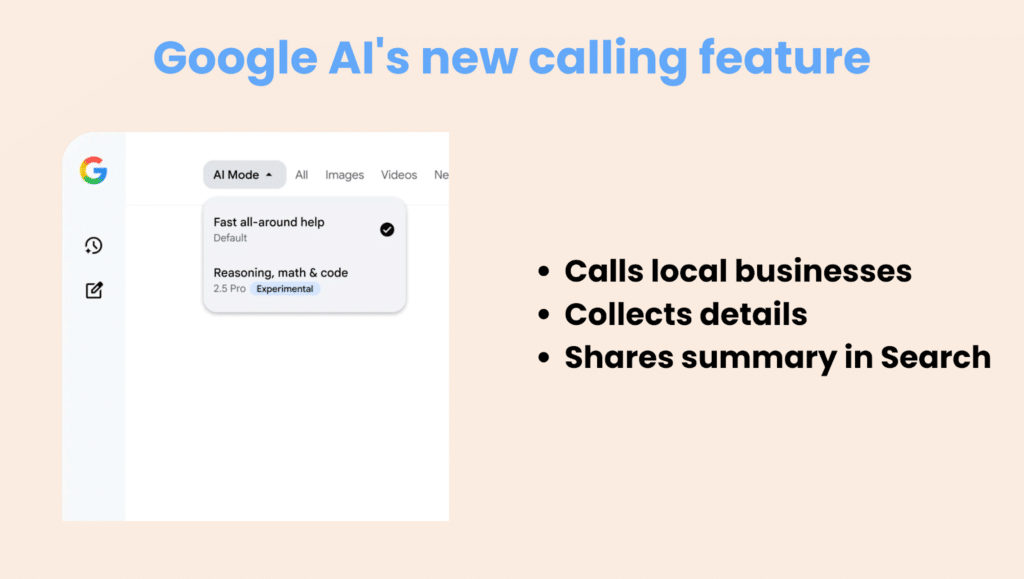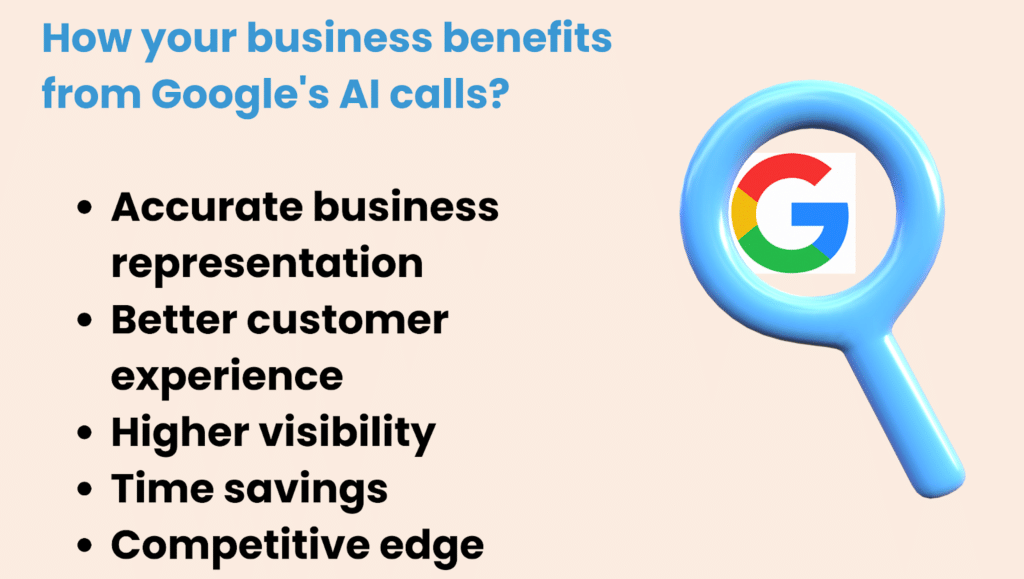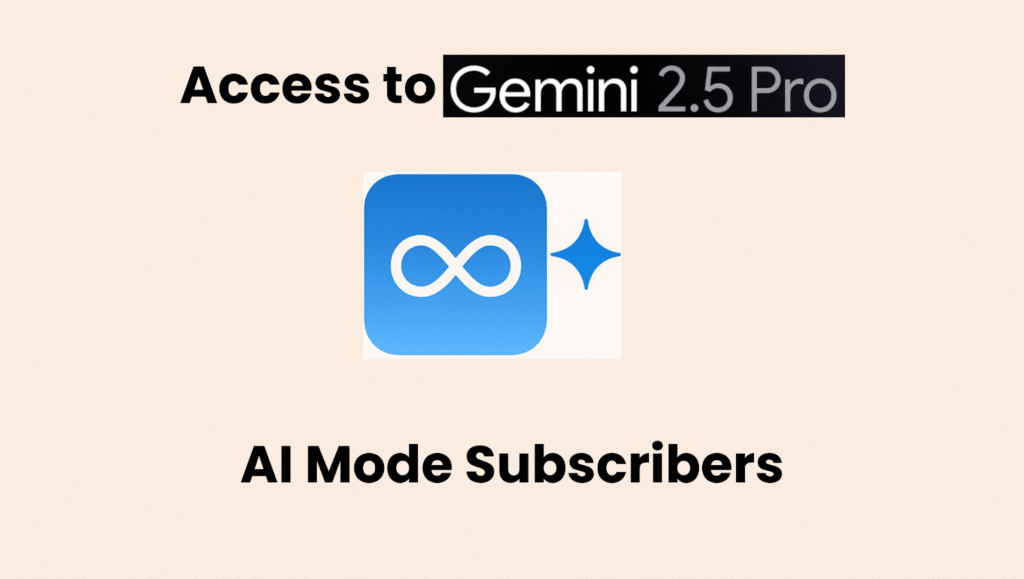Hate calling businesses? Google’s AI is ready to take that task off your hands.
This is part of Google’s new AI Search update, which introduces “agentic capabilities.” In simple terms, these are AI tools that don’t just show you information but take action on your behalf. That now includes making automated calls to local businesses to gather details about prices, availability, or services, and then return a clean, easy-to-read summary directly in Search.
For users, this means no more juggling multiple websites or spending time on the phone to compare options. For businesses, it signals a new kind of customer interaction, one where your first impression may come through an AI-driven call.
In this blog, we’ll break down how the feature works, what it means for searchers, and why local businesses should be preparing now to make the most of it.
Table of contents
What are agentic capabilities in Google Search?

Agentic capabilities are AI functions that take independent action for the user. Until now, Google’s AI-powered Search has mainly focused on presenting results, suggesting answers, and summarizing content.
With this latest Google update, AI can go further: interacting with businesses directly to gather information. Google says the AI will use both online data and automated calls to provide answers.
For instance, a search for “pet groomers near me” may now show an option to “Have AI check pricing.” Once selected, the AI will:
- Call local pet groomers
- Ask about pricing, availability, or services
- Collect responses from different businesses
- Present a simplified summary inside Search
As Google’s VP & Head of Google Search, Liz Reid explains-
We want Search to do more of the work for you — not just helping you find information, but actually completing tasks like calling a business to check details, so you can focus on making the decision that’s right for you.
— Liz Reid, VP & Head of Google Search
This new capability saves users from having to compare multiple websites or make several phone calls.
Why this matters for users
For everyday users, the advantages are clear:
- Time savings: Information is gathered quickly without manual effort.
- Less stress: Those uncomfortable with making calls can now avoid the process entirely.
- Consolidated results: Pricing and service details appear in a single, organized summary.
- Better decision-making: Users spend less time searching and more time making informed choices.
This aligns with a growing trend where people prefer AI to handle repetitive or routine tasks, allowing them to focus on decisions that matter.
What it means for businesses

Businesses will now start receiving AI-generated calls from Google AI Search. While the voice may sound slightly robotic, these are legitimate inquiries and represent a direct channel to potential customers.
How your business responds will determine how it appears in Google’s AI-generated summaries.
- Accuracy business representation: Clear and correct answers ensure your business is represented properly.
- Better customer experience: Shoppers get faster, clearer summaries when comparing options.
- Higher visibility: Responsive businesses are more likely to appear as recommended options.
- Time savings: AI answers common queries upfront, reducing repetitive calls and freeing staff to focus on real customer interactions.
- Early-mover advantage: Being prepared now positions your business ahead of competitors who may take longer to adapt to AI-driven search changes.
Practical tips for businesses
To prepare, businesses can take a few proactive steps:
- Add FAQs to your Google Business Profile: Preempt common questions (pricing, services, hours) so AI and users can find accurate answers faster.
- Train staff and use call-tracking: Using simple scripts or call-tracking can help maintain consistency and reduce confusion in the AI-generated summaries.
- Expect AI calls: These automated calls are legitimate and should be handled with care. Treat them as you would a real customer inquiry.
- Check your online data: Google’s AI will still reference your website, Google Business Profile, and online directories. Keep them updated and consistent.
- See this as an opportunity: Businesses that respond well to AI calls could gain an edge over competitors who aren’t prepared.
Early concerns and challenges
Like any new tool, this rollout raises some questions:
- Staff experience: Employees may initially mistake AI calls for spam. Clear identification from Google will be important.
- Response consistency: Mixed answers could lead to confusing AI summaries. Training your staff is the key.
- Impact on small businesses: Smaller teams that value direct interaction may worry about losing personal touch. Balancing AI efficiency with human service will matter.
Access to Gemini 2.5 Pro

Alongside this rollout, Google introduced Gemini 2.5 Pro, available to AI Mode subscribers. This advanced model supports more complex queries like reasoning, math, and coding.
While it’s not directly tied to the Google AI calls local businesses feature, it highlights Google’s broader direction: building AI tools that don’t just present information but actively help users.
How Birdeye fits into the picture
Google’s new AI calling feature highlights a broader shift in how people discover and interact with businesses. Search engines are moving from simply showing information to directly engaging with businesses on behalf of users.
For local businesses, this means accuracy and responsiveness across every channel, phone, listings, reviews, and online profiles are more important than ever. Tools like Birdeye help businesses in:
- Keeping business information up to date across directories, so AI and customers find the correct details.
- Collecting and managing customer reviews, which often influence how businesses appear in search results.
- Centralizing customer communication, making it easier to respond quickly and consistently across different platforms.
While Google AI calls create a new touchpoint, businesses that already focus on accurate data, clear communication, and strong online visibility will be best positioned to benefit. Birdeye provides one way to manage these areas effectively, ensuring businesses are prepared for this next phase of AI-assisted search.
Final thoughts
Google’s new AI calling feature is more than a minor update; it’s a preview of where search is heading. Now, search engines are no longer just information directories; they are becoming personal assistants that collect, filter, and present answers directly.
Imagine this in action:
- Looking for a dry cleaner? AI checks prices for you.
- Comparing salons? AI calls and summarizes availability.
- Searching for a restaurant? AI collects reservation details.
For users, this shift means faster, simpler, and less stressful interactions. For businesses, it introduces a new kind of customer touchpoint, one where AI gathers details on their behalf. The integration of online and offline data creates new expectations, making it essential for businesses to ensure accurate information and responsive communication.
The businesses that adapt quickly to AI-assisted search will be better positioned to capture visibility, trust, and customers in this new search experience.

Originally published









